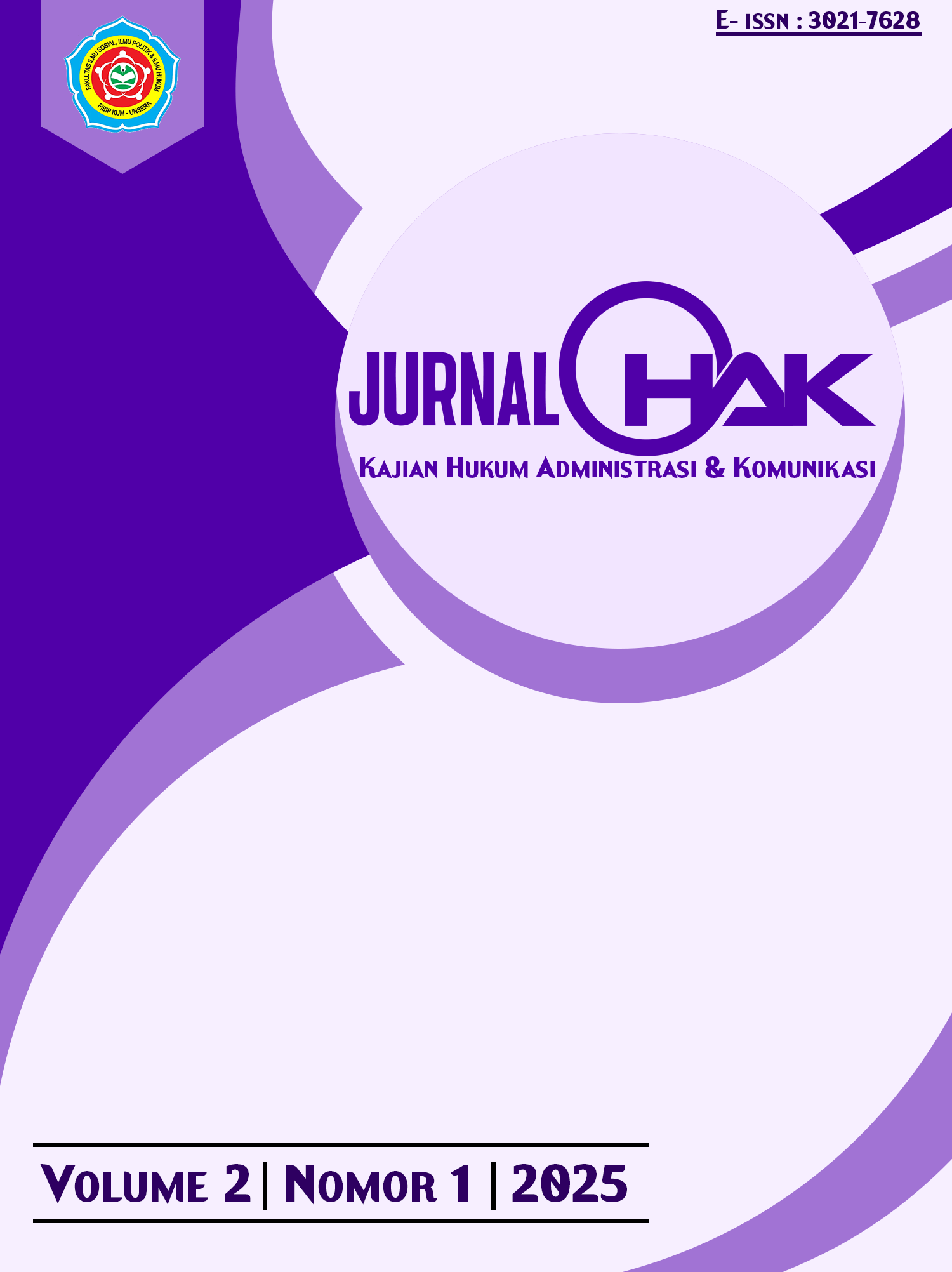Sekuritisasi Pacific Solution: Studi Kasus Implementasi Kebijakan Penahanan Luar Negeri Australia di Nauru
DOI:
https://doi.org/10.30656/rqnp2p50Abstract
Australia has restored offshore detention to Nauru through the Pacific Solution despite continuing criticism globally and violations of human rights. Its continuation raises the question of how this highly debatable policy can still exist. Securitization theory is used in this study to show how asylum seekers are considered threats, resulting in strong state measures to maintain their safety. The study seeks to investigate how the Australian government and media support offshore detention, and to examine the tactics used by humanitarian organizations to challenge this approach. A qualitative case study approach is used in the study, which involves critical discourse analysis to look at political statements, media reports, and advocacy materials from 2024. An examination of the situation shows that both political figures and media used alarming and negative language to describe asylum seekers. These narratives changed public opinion and helped people think offshore detention was necessary for security. Critically, discussions advocating legal and moral points of view remained largely confined to a small audience. The conclusion is that this policy works only by being discussed as a security threat rather than its effects on the crisis.
References
Jurnal:
Abbondanza, G. (2024). Out of sight, out of mind? The bipartisan Australian foreign policy on irregular migration. Australian Journal of International Affairs, 78(5), 702-721.
Aulden Warbrooke. (2014). Australia’s ‘Pacific Solution’: Issues for the Pacific Islands. Asia & the Pacific Policy Studies, 1(2), 337–348. https://doi.org/10.1002/app5.32
Alunaza, H., Maulana, I., & Sudagung, A. D. (2018). The Pacific Solution as Australia Policy towards Asylum Seeker and Irregular Maritime Arrivals (IMAs) in John Howard Era. Jurnal Ilmiah Hubungan Internasional; Vol. 14 No. 1 61-75 ; 2406-8748 ; 2614-2562. https://journal.unpar.ac.id/index.php/JurnalIlmiahHubunganInternasiona/article/view/2789
Every, D., & Augoustinos, M. (2007). Constructions of racism in the Australian parliamentary debates on asylum seekers. Discourse & Society, 18(4), 411–436. https://doi.org/10.1177/0957926507077427
Hodge, P. (2019). # LetThemStay# BringThemHere: Embodied politics, asylum seeking, and performativities of protest opposing Australia’s Operation Sovereign Borders. Environment and Planning C: Politics and Space, 37(3), 386-406.
Maclellan, N. (2013). What has Australia done to Nauru?: politics, privatisation and policing under the'Pacific solution'. Overland, (212), 4-11.
Mckay, F. H., Thomas, S. L., & Kneebone, S. (2012). “it would be okay if they came through the proper channels”: Community perceptions and attitudes toward asylum seekers in Australia. Journal of Refugee Studies, 25(1), 113–133. https://doi.org/10.1093/jrs/fer010
Moretti, S. (2021). Between refugee protection and migration management: The quest for coordination between UNHCR and IOM in the Asia-Pacific region. Third World Quarterly, 42(1), 34-51.
Moretti, S. (2022). Contested regionalism in the Asia-Pacific: the case of the Bali Process and the protection of refugees. Journal of Ethnic and Migration Studies, 48(12), 2855-2872.
Susanto, C. A. (2024). Kebijakan Migrasi Australia Dalam Hal Pengalihan Pengungsi dan Pencari Suaka ke Nauru dan Papua Nugini. Jurnal Hubungan Internasional; Vol. 17 No. 2 (2024): JURNAL HUBUNGAN INTERNASIONAL; 387-405 ; 2715-1565 ; 1411-9382. https://e-journal.unair.ac.id/JHI/article/view/56191
Salyer, J. C., Dalsgaard, S., & West, P. (2020). “It Is Not Because They Are Bad People”: Australia’s Refugee Resettlement in Papua New Guinea and Nauru. The Contemporary Pacific, Vol. 32 No. 2. 435-448 . Https://Doi.Org/10.1353/Cp.2020.0036.
Taureck, R. (2006). Securitization theory and securitization studies. Journal of International Relations and Development, 9(1), 53–61.
Tanzila, E. (Elya), & Tjarsono, I. (Idjang). (2015). Motivasi Australia Menerapkan Kebijakan Sekuritisasi Terhadap Irregullar Maritime Arrivals (Ima) Tahun 2001-2008. Jurnal Online Mahasiswa Fakultas Ilmu Sosial Dan Ilmu Politik Universitas Riau. https://www.neliti.com/publications/32208/motivasi-australia-menerapkan-kebijakan-sekuritisasi-terhadap-irregullar-maritim
Prasad, N. (2021). Lessons from Australia's Pacific Solution. Forced Migration Review, (68).
Situs Web:
Al Jazeera. (6 Maret 2019) Australia to send asylum seekers to remote island for treatment. Al Jazeera. https://www.aljazeera.com/news/2019/3/6/australia-to-send-asylum-seekers-to-remote-island-for-treatment
Doctors Without Borders (Médecins Sans Frontières). (11 Oktober 2018). Australian government should end offshore detention on Nauru. Médecins Sans Frontières. https://www.msf.org/australian-government-should-end-offshore-detention-nauru
Farrell, P., Evershed, N., Davidson, H., & Wall, J. (10 Augustus 2016). The Nauru files: cache of 2,000 leaked reports reveal scale of abuse of children in Australian offshore detention. The Guardian. https://www.theguardian.com/australia-news/2016/aug/10/the-nauru-files-2000-leaked-reports-reveal-scale-of-abuse-of-children-in-australian-offshore-detention
Human Rights Watch. (2 Agustus 2016). Australia: Appalling abuse, neglect of refugees on Nauru. Human Rights Watch. https://www.hrw.org/news/2016/08/02/australia-appalling-abuse-neglect-refugees-nauru
Refugee Council of Australia. (2023). Operation Sovereign Borders: Offshore detention statistics. Refugee Council of Australia. https://www.refugeecouncil.org.au/operation-sovereign-borders-offshore-detention-statistics/
Downloads
Published
Issue
Section
License
Copyright (c) 2025 JURNAL HAK

This work is licensed under a Creative Commons Attribution-ShareAlike 4.0 International License.



